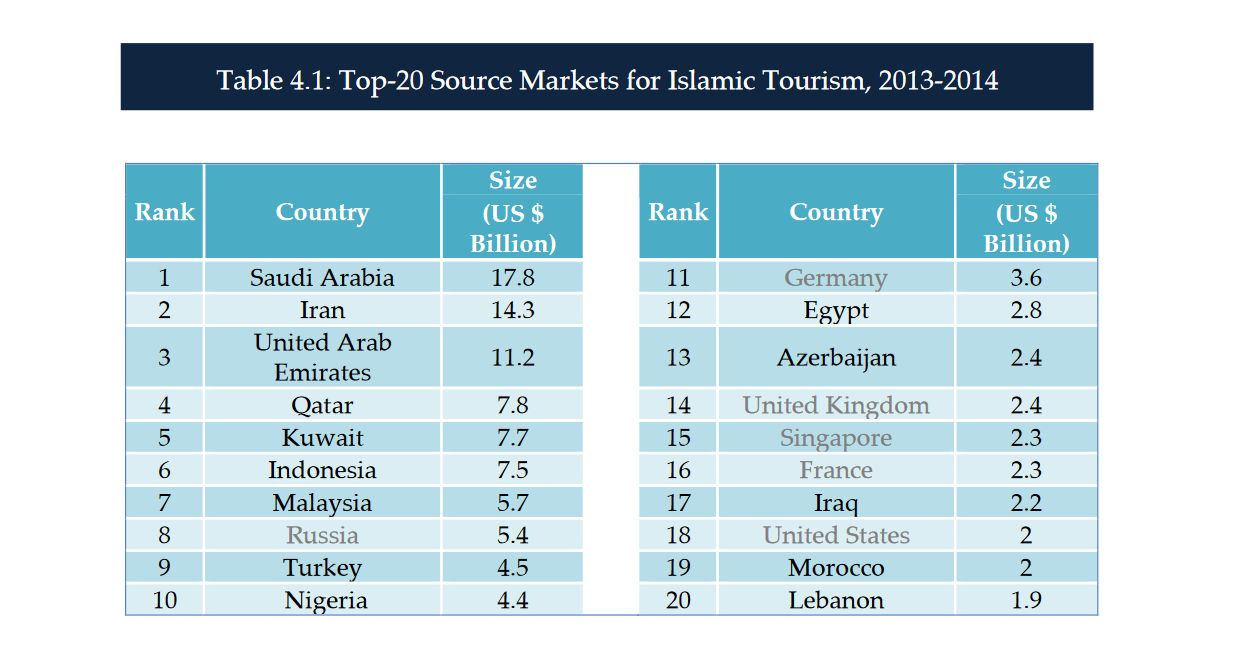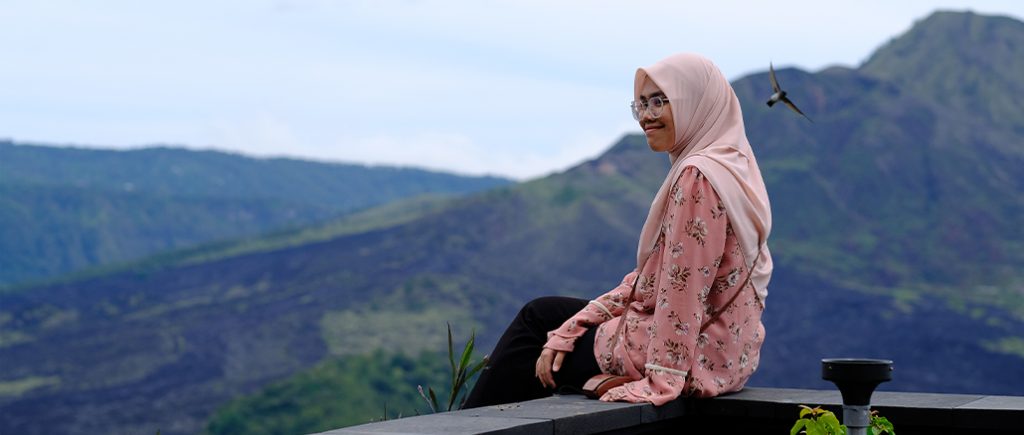In the past few years, many countries around the world have put priority on the tourism sector, and increasingly the term ‘Halal tourism’ had become more commonplace. According to the Organization of Islamic Cooperation (OIC), the definition of Halal tourism is ‘Muslim travelers who do not wish to compromise their basic faith-based needs while traveling for a purpose, which is permissible.’ In short, Halal tourism can be defined as a sub-type of tourism that caters the faith-based needs of Muslim such as prayer facilities, Halal meals, water usage friendly washrooms (i.e. washrooms equipped with washers/bidets for Islamic toilet etiquette), recreational facilities without any non-Halal activities such as casino and bar, segregated area for men and women, and so on. The following table show the top-20 global Muslim tourism source markets. 1

In Southeast Asia, Malaysia is a leading Halal tourism destination and the first in the region to have an institution appointed specifically for Halal tourism affairs. The Islamic Tourism Center (ITC) was launched in March 2009 to assist the Ministry of Tourism of Malaysia in undertaking strategic tourism research and market intelligence as well as providing training and capacity-building services in relation to Islamic tourism. 2 Later in 2012, Malaysia started to develop a standard for Muslim Friendly Hospitality Services (MFHS) and in 2014 a document titled “Draft Malaysian Standard: Muslim Friendly Hospitality Services – Requirements” was released for public comment. 3 This national standard was the first to be published in Southeast Asia. Malaysia’s neighbor, Singapore, does not have a Halal tourism standard. Instead, the Islamic Religious Council of Singapore (Majelis Ugama Islam Singapura, MUIS) is known for their strict Halal certification, and thus many Halal certified restaurant and prayer rooms in public areas flourish, and a small number of Muslim Singaporeans also supports the country’s Halal tourism development. Thailand, already a big tourist destination, also joined the effort of tapping into the Muslim market and opened its first Halal hotel, the Al Meroz in 2016.
How about Indonesia?
Being one of the three Muslim majority countries in Southeast Asia and housing the largest Muslim population in the world, it is reported that Indonesia has developed a successful Halal tourism industry. In 2018, Indonesia saw 18% Halal tourism market growth and obtained more than 40 trillion rupiah (about 286 million USD) earnings from this industry. In 2019, its Ministry of Tourism and Creative Economy announced that from their target of 20 million inbound tourists, about 25% or 5 million of arrivals are Muslim inbound tourists. 4 Indonesia seems eager to compete in the Halal tourism industry yet it had a slower start compared to other countries, especially with its biggest rival, Malaysia. Nevertheless, the rationale for Indonesia in implementing Halal tourism might need to be reassessed. According to Statistic Indonesia (Badan Pusat Statistik Indonesia, BPS), the five countries from whom Indonesia received most inbound tourists were Malaysia, Singapore, China, Australia, and West Timor. This suggests that most inbound visitors are not Muslim, therefore it raises the question of the importance of Halal tourism implementation. With a finite number of tourists to be attracted, could Indonesia’s investment in the sector be chasing diminishing returns?
The success of Halal tourism in Indonesia was marked when its province of West Nusa Tenggara received the award of World’s Best Halal Tourism Destination and World’s Best Halal Honeymoon Destination at the World Halal Travel Awards 2015 in Abu Dhabi, UAE. Given this, Arief Yahya, until his departure as Minister of Tourism in 2019, was instructed by President Joko Widodountil to increased efforts to develop Indonesia’s Halal tourism. This involved creating and developing new destinations. In 2018, 10 National Priority Halal Destinations of GMTI (Global Muslim Travel Index) standards, including Aceh, Riau and Riau Islands, West Sumatra, Jakarta, West Java, Central Java, Yogyakarta, East Java (Malang Raya), Lombok, and South Sulawesi (Makassar and its surroundings) 5 were announced to the public. 6 Nevertheless, it was only in 2012 that the Halal Tourism Indonesia Association (Perkumpulan Pariwisata Halal Indonesia, PPHI) was established and much later in 2019 The Ministry of Tourism finally published its Guideline for Halal Tourism Implementation, five years behind Malaysia, a country often seen as its biggest market competitor.
The development of Halal tourism in Indonesia has been far from smooth-sailing. Siti Chodijah, lecturer at University of Mataram, commented that the award-winning West Nusa Tenggara Province, only won the award in 2015 because of an online photograph voting system. In competing with Middle Eastern countries who submitted pictures of mosques and desserts, West Nusa Tenggara became distinctive by submitting a picture of Benang Setokel Waterfall. Winning the award certainly had some impact, since after that, West Nusa Tenggara became the only province owning a regional regulation for Halal tourism, first published in 2015 7 and revised in 2016 8. Yet, despite enactment of regulations and apprent successes, there appears a distinct lack of interest – inactivity even – from local business owners. Furthermore, Halal tourism development in the province declined after 2018 due to two main reasons: The 7.0 magnitude earthquake in August 2018 and the inauguration of governor Zulkieflimansyah who is serving the term from September 2018 to 2023. Although he comes from the Islam-based political party Prosperous Justice Party (Partai Keadilan Sejahtera, PKS), Zulkieflimansyah does not seem to share the same fervor for Halal tourism as ex-governor Muhammad Zainul Majdi who preceded him.
Rather than Halal Tourism, Zulkieflimansyah has focused more on Rise NTB 9 Movement (Gerakan NTB Bangkit) that aims to rebuild the island after the earthquake in August 2018. Furthermore, local business owners themselves are torn between supporting or rejecting Halal tourism development. The already developed region for tourism in Senggigi and Tiga Gili (Three Islands in the local vernacular), nicknamed ‘The Party Spots’ by locals, are afraid to lose tourists if Halal tourism is implemented in their area. This is because most tourists visiting these regions are western tourists out to enjoy the hedonistic pleasures of alcoholic beverages and and an active nightlife scene, they also wear skimpy clothing for sunbathing or beach activities, all of which would certainly be banned if Halal tourism is implemented. Another problem is the belief that in obtaining Halal certification would needs lengthy and complicated bureaucratic paperwork. An uncertain number of Muslim tourists visiting the island is also a concern for local business owners who might consider to join the Halal tourism industry.
Given these issues, Halal tourism in Indonesia is not advancing as was expected and Information about Halal destinations in Indonesia still remains scarce. This writer checked the official website dedicated to Halal tourism destinations in Indonesia 10 in early March 2020 just to see that it offers only short descriptions about accommodation and Halal restaurants in the eight provinces. It seems that having a large majority Muslim population does not automatically mean Indonesia has an upper hand either, instead the Government faces a challenge because consciousness about obtaining Halal certification remains low. The majority might reason that they are already Muslim so they do not need to convince other people about the halal-ness of their products and services. Few understand that Halal certification works as reassurance for inbound Muslim tourists.
Marketing is also a concern for Indonesia’s Halal tourism. Although the Ministry of Tourism stated that they would like to attract the Middle East market, there are two imposing problems here. The first is that up until now, Muslim tourists in Indonesia have consisted mainly of domestic tourists and inbound tourists from Malaysia whose characteristics differ from those visitors from the Middle East. Malaysian tourists have closer characteristics with domestic tourists; they love taking pictures, vacationing with close family members, and enjoy the local culinary traditions while keeping a reasonable price in mind. Middle Eastern tourists on the other hand tend to expect high-end products and service such as world-class hotels, private villas and infrastructure. This leads to the second problem: As long as Indonesia focuses on the steady market they have already obtained, and as long as the popular belief remains that Middle Eastern inbound tourists prefer luxurious travel, this leads people to question whether Indonesia is really ready to cater to the demands of these Middle Eastern tourists.
Indonesia’s Ministry of Tourism has also faced dilemma. In the latter half of 2019, its name was changed to Ministry of Tourism and Creative Economy with Wishnutama Kusubandio, ex-co founder and CEO of NET television channel, as its minister. 11 Since Wishnutama has a background in the entertainment industry, it expected that the Ministry will shift focus to the development of a creative economy. This was confirmed in an interview in March 2020 with a sources within the Ministry. It seems the the Ministry is torn between focusing on developing Indonesia’s 5 Super Priority Destinations (a narrowing of the 10 New Bali plan, which as the name suggests, aims to create new tourism destinations as famous as Bali Island), as well as the Halal Destinations plan. Another obstacle is the horrendous access and facilities provided in the some of the destinations, such as Pink Beach in Lombok Island and West Nusa Tenggara Province. Although the beach is famous for its pink sand, this is only accessible along a dangerously rough and bumpy road; even the locals recommend taking a boat from another beach because it is faster and safer. The Government of Indonesia needs to realize that no matter how beautiful the destination might be, it is pointless if tourists are unable to reach the place in reasonable time and without discomfort.
Conclusion
Although it is a Muslim majority country with the largest Muslim population in the world, Indonesia still faces many challenges in developing Halal tourism. It started relatively late compared to neighboring countries. Contrary to expectations, its large Muslim population failed to spur Halal tourism implementation; instead many local business owners do not see the need for Halal certification. Furthermore, scarcity of information and a lack of facilities at Halal destinations might prevent tourists also. Even though there is effort to improve Halal tourism development programs (and indeed there was some improvement such as publishing of national Halal tourism guidelines and the Halal tourism Strategic Plan), changes in power and interests leads to uncertainty for Halal tourism development in Indonesia. With such challenges yet to be faced in implementing Halal tourism in Indonesia, set against the possible profits and benefits for the industry, it might be time to reevaluate the importance of Halal tourism in Indonesia.
Cahaya R. Putri
Graduate School of Asian and African Studies, Kyoto University
(PhD Candidate, Division of Southeast Asian Area Studies)
Banner Image: Bali, Indonesia :31/01/2020 : Tourists spotted at Mount Batur Outlook Point, Kintamani, Bali, Indonesia. Photo Casa nayafana / Shutterstock.com
Reference:
COMCEC. 2016. Muslim Friendly Tourism: Understanding the Demand and Supply Sides in the OIC Member Countries. COMCEC Coordination Office.
Economic and Social Research and Training Centre for Islamic Studies (SESRIC), New Directions in the Tourism Sector: Islamic Tourism in the OIC Countries (https://www.oic-oci.org/docdown/?docID=2967&refID=1098)
Kementerian Pariwisata Republik Indonesia, Rencana Strategis Pariwisata Halal Indonesia 2019-2024 (2019)
Badan Pusat Statistik, Perkembangan Pariwisata dan Transportasi Nasional Juni 2019: No. 62/08/Th.XXII, (2019)
Peraturan Gubernur Nusa Tenggara Barat No. 51 Tahun 2015 tentang Wisata Halal
Peraturan Daerah Provinsi Nusa Tenggara Barat No. 2 Tahun 2016
Notes:
- Economic and Social Research and Training Centre for Islamic Studies (SESRIC), New Directions in the Tourism Sector: Islamic Tourism in the OIC Countries (https://www.oic-oci.org/docdown/?docID=2967&refID=1098) ↩
- https://itc.gov.my/corporate/about-us/ (accessed 17/3/2020) ↩
- https://itc.gov.my/industry/islamic-tourism-standards/muslim-friendly-hospitality-services/ (accessed 17/3/2020) ↩
- https://kominfo.go.id/index.php/content/detail/18069/5-tahun-kembangkan-pariwisata-halal-indonesia-akhirnya-raih-peringkat-pertama-wisata-halal-dunia-2019/0/artikel_gpr (accessed 26 April 2020) ↩
- https://kominfo.go.id/index.php/content/detail/18069/5-tahun-kembangkan-pariwisata-halal-indonesia-akhirnya-raih-peringkat-pertama-wisata-halal-dunia-2019/0/artikel_gpr (accessed 26 April 2020) ↩
- However, in the current official Halal tourism destinations website (http://halaltourism.id/#/ (accessed 17/3/2020), the number is reduced to eight destinations. Central Java, Yogyakarta, and South Sulawesi is omitted while Bali is included instead. ↩
- Peraturan Gubernur Nusa Tenggara Barat No. 51 Tahun 2015 tentang Wisata Halal ↩
- Peraturan Daerah Provinsi Nusa Tenggara Barat No. 2 Tahun 2016 ↩
- Nusa Tenggara Barat (English: West Nusa Tenggara (Province) ↩
- http://halaltourism.id/ ↩
- A free to air local television channel in Indonesia owned by INDIKA GROUP ↩

